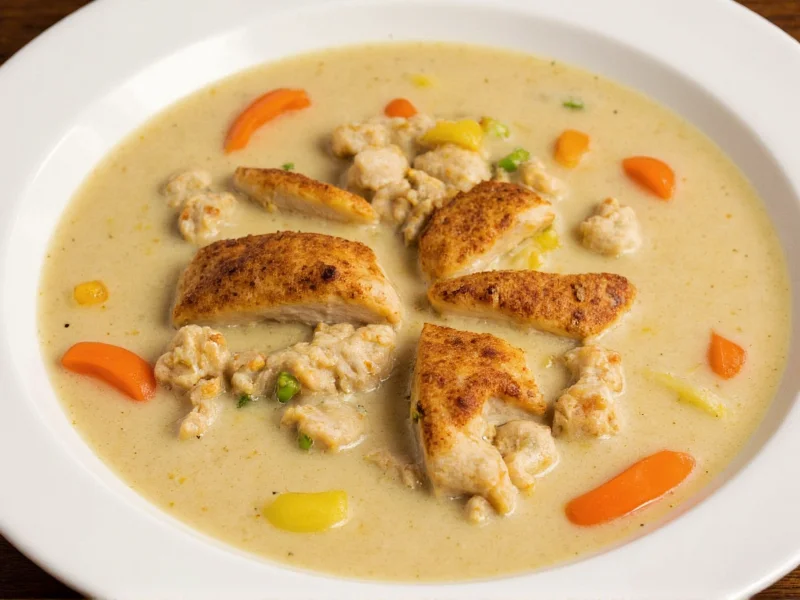Combining chicken breast with cream of chicken soup is a time-tested method for creating satisfying meals with minimal preparation. This pairing works exceptionally well because the condensed soup provides instant flavor depth and creaminess while helping to keep the lean chicken breast moist during cooking—a common challenge with this popular protein.
Why This Combination Works So Well
Chicken breast's mild flavor serves as the perfect canvas for the savory, herb-infused profile of cream of chicken soup. The soup's thickened base creates an instant sauce that would otherwise require making a roux and simmering stock. Professional chefs often use this technique when developing quick-service menu items, recognizing that the soup's consistent flavor profile delivers reliable results even for novice cooks.
Essential Ingredients and Smart Substitutions
While the core ingredients remain simple, understanding your options ensures success every time:
| Ingredient | Standard Amount | Smart Substitutions |
|---|---|---|
| Boneless chicken breasts | 1.5 lbs | Chicken thighs (adjust cooking time), turkey cutlets |
| Cream of chicken soup | 1 (10.5 oz) can | Cream of mushroom, celery, or homemade substitute |
| Chicken broth | ½ cup | Water + 1 tsp Better Than Bouillon |
| Garlic | 2 cloves, minced | ½ tsp garlic powder |
| Dry white wine | ¼ cup | Additional broth or lemon juice |
Step-by-Step Preparation Guide
Follow these professional techniques for perfect results:
- Prep the chicken: Pound breasts to even ¾-inch thickness using a meat mallet or rolling pin. This ensures uniform cooking—uneven thickness causes dry spots.
- Season generously: Pat dry with paper towels, then season both sides with salt, pepper, and ½ teaspoon paprika for color.
- Sear properly: Heat 1 tablespoon olive oil in an oven-safe skillet over medium-high heat. Sear chicken 2-3 minutes per side until golden brown (don't cook through). Remove and set aside.
- Build the sauce: In the same pan, sauté ½ cup diced onions until translucent. Add 1 can cream of chicken soup, ½ cup broth, ¼ cup dry white wine, and 2 minced garlic cloves. Whisk until smooth.
- Finish cooking: Return chicken to the skillet, spooning sauce over the top. Simmer covered on low heat for 12-15 minutes until chicken reaches 165°F internally.
Avoid These Common Mistakes
Even experienced cooks encounter pitfalls with this simple recipe:
- Overcooking chicken: Use a meat thermometer—remove at 160°F as carryover cooking will reach 165°F. Overcooked chicken becomes dry regardless of the sauce.
- Skipping the sear: That initial browning creates flavor compounds through the Maillard reaction that elevate the entire dish.
- Using cold ingredients: Let refrigerated soup and broth come to room temperature before mixing to prevent sauce separation.
- Stirring too vigorously: When combining soup and broth, gentle whisking prevents the sauce from becoming gluey.
Creative Variations for Different Tastes
Transform this basic preparation into distinctive meals:
- Mediterranean style: Add sun-dried tomatoes, kalamata olives, and fresh oregano during the last 5 minutes of cooking
- Southwestern twist: Mix in 1 diced green chile, ½ teaspoon cumin, and top with avocado and cilantro
- Herb garden version: Stir in 2 tablespoons each of fresh thyme, rosemary, and parsley before finishing
- Creamy mushroom adaptation: Replace half the soup with cream of mushroom and add 8 oz sliced cremini mushrooms
Serving and Pairing Recommendations
This versatile dish pairs beautifully with several sides:
- Classic comfort: Serve over egg noodles or mashed potatoes to soak up the creamy sauce
- Lighter option: Pair with roasted asparagus or green beans almondine
- Complete meal: Add 1 cup frozen peas to the sauce during the last 3 minutes of cooking
- Low-carb choice: Serve over cauliflower rice or zucchini noodles
Storage and Reheating Guidelines
Proper handling maintains quality for leftovers:
- Refrigeration: Store in airtight container for up to 3 days—keep chicken submerged in sauce to prevent drying
- Freezing: Freeze portions for up to 2 months; thaw overnight in refrigerator before reheating
- Reheating: Warm gently in covered skillet with 1-2 tablespoons broth over low heat (microwaving makes chicken rubbery)
- Reviving sauce: If sauce separates, whisk in 1 teaspoon cornstarch mixed with 2 tablespoons cold water
Frequently Asked Questions
Can I use low-sodium cream of chicken soup for this recipe?
Yes, low-sodium versions work well. You'll need to adjust seasoning carefully—add salt gradually while cooking and finish with a squeeze of lemon to enhance flavors without excess sodium.
How do I prevent the sauce from becoming too thick?
Maintain proper sauce consistency by starting with the full amount of broth called for in your recipe. If sauce thickens too much during cooking, gradually whisk in additional warm broth, 1-2 tablespoons at a time, until desired consistency is reached.
What's the best way to make this recipe dairy-free?
Create a dairy-free version by using a plant-based cream of chicken soup alternative and substituting coconut milk for any additional dairy. Many grocery stores now carry dairy-free condensed soup options that work perfectly in this application.
Can I prepare this dish ahead of time for meal prep?
This recipe adapts well to meal prep. Cook chicken just until nearly done (160°F), then cool completely in the sauce before portioning. When reheating, the chicken will finish cooking gently in the sauce, preventing overcooking and maintaining moisture.
Why does my chicken breast sometimes turn out dry even with the soup?
Chicken breast dries out when overcooked past 165°F internal temperature. Use an instant-read thermometer and remove from heat at 160°F. The residual heat will carry it to proper temperature. Also ensure you're using chicken of uniform thickness—pound thicker portions to even out cooking.











 浙公网安备
33010002000092号
浙公网安备
33010002000092号 浙B2-20120091-4
浙B2-20120091-4